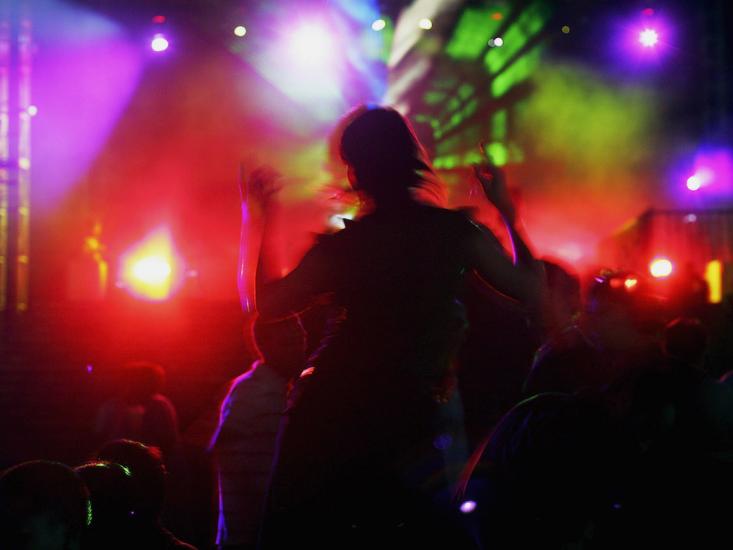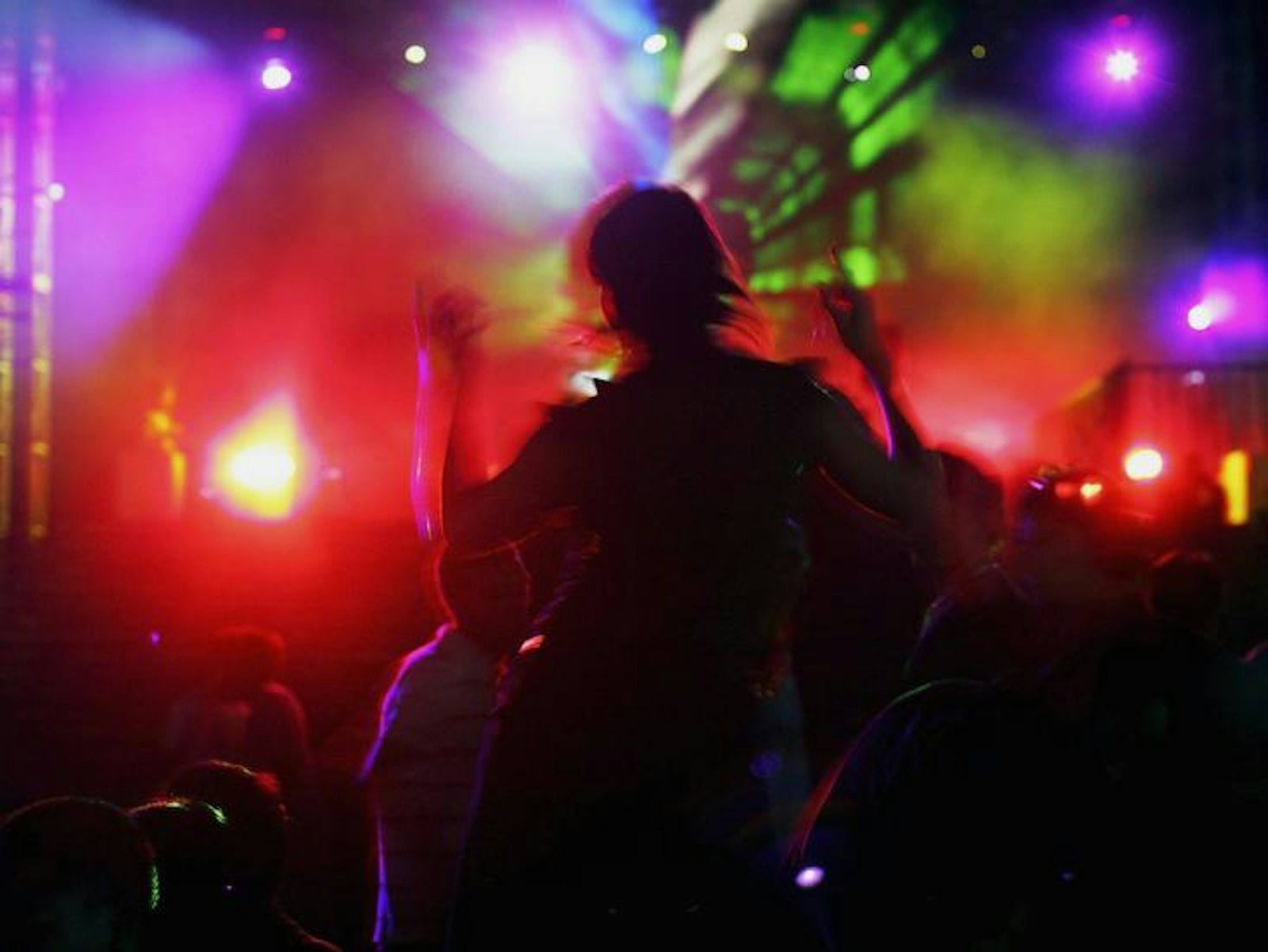When I was at the Firefly Music Festival in Delaware, in the summer of 2014, I took a 200 mg pill of ecstasy—Red Riddler—something I had done before. After the sets were over, the colors of the overhead lamps seemed more saturated against the sky. Each bulb’s top-right quadrant had a massive, prismatic aura, like it came off a rainbow.

A week after the concert, when my trip should’ve already been over, I was still seeing things. When I took my contacts out, the lights blurred into vast orbs, and hung in front of my eyes like Christmas lights. Researching, I came across some questionable Yahoo! Answers forums, and read for the first time about HPPD—Hallucinogen Persisting Perception Disorder, which is exactly what it sounds like. The condition is often disturbing, even frightening. It can compromise vision to the point where you’re no longer comfortable driving or even going outside. But I didn’t mind—it introduced an explosion of beauty into the world at a time when I needed it. Two months later I got LASIK eye surgery, which I’d scheduled before that summer. When the procedure was over, the lights were gone. That bummed me out, but I realized how lucky I was to have experienced HPPD—to have actually enjoyed it—and come out the other side with no ill effects.
Because I wanted to more fully understand what had happened to me, I spoke to John Halpern, who, along with teaching addiction psychiatry at Harvard Medical School, directs the Laboratory for Integrative Psychiatry at McLean Hospital. His primary area of study is the long-term cognitive effects of hallucinogens—he’s been researching HPPD for more than a decade. In our conversation Halpern spoke about the causes of HPPD, what kinds of people are prone to it, and why he’s interested in consciousness and drugs.
How would you define Hallucinogen Persisting Perception Disorder?
It’s predominantly a rare anxiety-related disorder, occurring particularly with people who have issues of control and anxiety to begin with. It’s like the PTSD you can get after a drug experience. The overlap is interesting; when we try therapy with people who have severe PTSD, the more you pay attention to the thing that makes them anxious, the worse they get—much more panicked, unsettled. This is the cardinal feature of HPPD. They truly believe they’ve gone crazy and damaged their brain. They gaslight themselves and it gets worse. There’s elements of dissociation and anxiety woven through the fabric of the person with this disorder. It may also be that these people do have some sort of altered processing in the visual cortex, and the issue became noticeable when they got themselves intoxicated with hallucinogens. Sometimes it’s just that they’ve tried an SSRI like Prozac, or antibiotics, or alcohol even.
What are the typical symptoms of HPPD?
It starts up within 24 hours to three days from use of the offending substance. There are some who claim it emerges more than a month after the last use, but the longer it’s been since that use, the less likely it really is related to that substance. Some say there’s a period when they felt like they got back to normal, but then something triggers it, and it’s almost like they’re back in the experience, reminiscent of synesthesia. The most common experience is some sort of visual disturbance. People will say they experience trails, their hand trailing behind where it really is. That, I think, is pretty classical. Also a non-migrainous aura, bright sparkly lights rotating around their field of vision—like static on a TV—positive or negative afterimages, changing color, typically in bright lights. We can all induce this, but with HPPD it’s much more intensely felt. There may be an element of self-suggestibility here, but to say that it’s just that would be really mean. Many people with this disorder, it’s like they want to revisit the scene of the crime by taking hallucinogens again. People have this toxic curiosity.
Why do you think LASIK eye surgery ended my HPPD?
Anything that perturbs vision or irritates it such as contacts or sub-par eyesight could be one of the unifying factors of the disorder. And so if something like LASIK reduces eye strain, eye exhaustion, you have more of a reserve to put up the filter everyone else has against something like HPPD, and you get through the day. Regaining your peripheral vision alone could reduce eye stress.
How do you treat HPPD?
Distraction is important. Recognizing that you’re getting anxious, noticing what your trigger points are that make HPPD come out, so you can start avoiding them, is important because of the neuroendocrine response involved. With anxiety, there’s a fight-or-flight response in your body, and those emotions change our perceptions and our propensity to take action. Then you start to feel like you’re gaining control. It’s important to realize you’ve not damaged your brain. Try therapy. Try BluBlocker sunglasses, which block out 100 percent of UV and blue light.
Some have said marijuana rekindled their HPPD and made it worse. Or made it better. But the classical, more accepted medications for HPPD are sedative hypnotic benzodiazepines, like Ativan or Klonopin. And, interestingly, what are those prescribed for? Anxiety. I think most psychiatrists don’t ever see anyone with HPPD, or just once or twice. Many times they don’t even bother asking, and people have learned to accept it and ignore it. But there are some people who really insist that it’s persisted for years and they feel damaged by it.
Which drugs give rise to it?
Primarily LSD. Probably more likely with some of these newer hallucinogenic substances. MDMA especially uncorks a lot of affect that gets embellished by anxiety and fear. But the substances derived straight from nature—peyote, mescaline, mushrooms, ayahuasca—no. These have thousands of years of historical use from ancient shamanic times to the present. If these things were hurting native peoples using them, they don’t need a white doctor from an ivy tower coming down to tell them that. They would know. Look at the Native American Church of North America, where I remain a scientific expert and completed the only study on long-term health and cognitive consequences of repeated hallucinogen use—I interviewed thousands and could not find one person with HPPD.
Can hallucinogens have a beneficial side?
More people today are trying psychedelics than back in the ’60s, but nobody thinks of it like that. I don’t think it’s my role to weigh in on such a weighty topic; each family is going to have to have their own discussion about that. But that being said, think about all the creative things that have happened—people’s experiences with hallucinogens—and it’s becoming more mainstream today. I got interested in psychedelics in medical school because I was very interested in whether there could be a medication to treat drug addiction. I was upset that people didn’t want to treat addicts well, and it led to my interest in psychiatry. People are saying they’ve experienced something positive, different from addiction or a recreational high. And when it comes to the intersection with medicine, it can bring some very interesting discoveries.
Kastalia Medrano is a writer from Littleton, Colorado, and has been backpacking the world for the last year and a half. Follow her on Twitter @KastaliaMedrano.






























